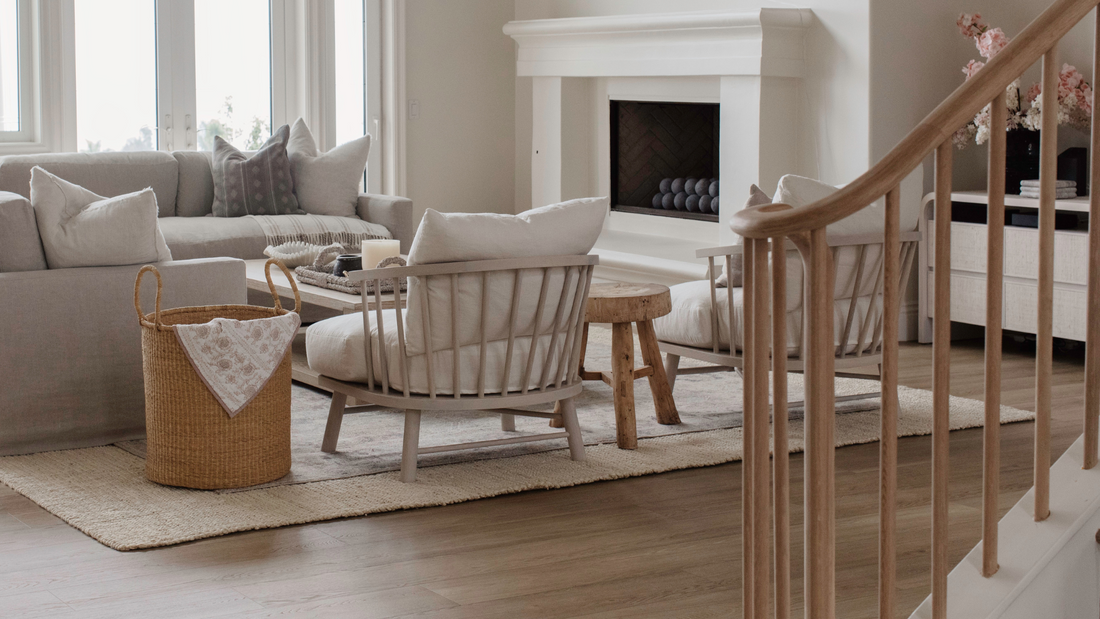Choosing the right flooring for your home is a key decision that affects its appearance and practicality. Stoneform® and bamboo flooring are popular choices, each offering unique benefits. In this comparison, we'll delve into the distinctive features of Stoneform® and bamboo flooring to help you make an informed decision.
Stoneform® is an innovative flooring solution developed by Hewn, combining high-quality limestone and virgin PVC with a proprietary scratch-resistant hardened acrylic wear layer. This technology results in a flooring product that excels in durability, water resistance, and aesthetic appeal. Stoneform® is designed to replicate the natural beauty of wood while providing superior resilience and ease of maintenance, making it a versatile choice for various home environments.
Bamboo flooring, on the other hand, is celebrated for its eco-friendly attributes and unique visual appeal. Made from the rapidly renewable bamboo plant, this flooring option is both sustainable and stylish. Bamboo flooring features distinctive grain patterns and a warm, natural look that adds character to any space. It’s a popular choice for those looking to enhance their home with an environmentally conscious material.
Let's take a look at how Stoneform® and bamboo flooring compare. This head-to-head comparison will help you understand the strengths and weaknesses of each option.
Durability and Stability
Stoneform®:
- Stoneform® Elite flooring features a 5mm core thickness, 1.5mm of sound absorbent padding, and a 30mil wear layer.
- Exceptional resilience against heavy foot traffic, scratches, and dents.
- The rigid core, made of premium limestone and virgin PVC, provides stability and can withstand kids, pets, and everyday household use.
Bamboo:
- Bamboo flooring is surprisingly durable with a hardness comparable to hardwoods like oak or maple.
- Its durability makes it suitable for various home environments, though it may be less resistant to heavy impacts compared to Stoneform®.
Water Resistance
Stoneform®:
- 100% waterproof, making it ideal for moisture-prone areas such as kitchens, bathrooms, and basements.
- The stone composite core prevents water damage and mold growth, protecting your subfloor.
Bamboo:
- Susceptible to water damage if not properly sealed.
- Less suitable for areas with high moisture levels unless treated with specific water-resistant finishes.
Aesthetic Appeal
Stoneform®:
- Mimics the natural beauty of wood with a range of colors and plank variation.
- Advanced printing techniques result in an authentic wood look and feel, enhancing the ambiance of any space.
Bamboo:
- Distinctive grain patterns and warm hues add unique character to any room.
- The natural appearance creates a cozy and inviting atmosphere.
Ease of Installation
Stoneform®:
- Features a click-lock installation system for easy and quick setup.
- Ideal for DIY enthusiasts and professionals alike.
Bamboo:
- Can be installed using various methods including click-lock, glue-down, or nail-down.
- Installation methods may require more preparation and expertise compared to Stoneform®.
Maintenance
Stoneform®:
- Low maintenance, requiring only regular sweeping and occasional mopping.
- The scratch-resistant surface ensures long-term durability and easy upkeep.
Bamboo:
- Requires regular cleaning and occasional resealing to maintain its appearance.
- Stains can be cleaned with a damp cloth, but the surface may need more attention compared to Stoneform®.
Environmental Impact
Stoneform®:
- Made from a combination of natural and synthetic materials.
- While durable, the environmental impact may be higher compared to natural flooring options.
Bamboo:
- Highly sustainable due to its rapid growth and renewable nature.
- Bamboo’s environmental benefits make it a preferred choice for eco-conscious homeowners.
In conclusion, choosing between Stoneform® and bamboo flooring depends on your specific needs, preferences, and lifestyle. If you prioritize durability, water resistance, and low maintenance, Stoneform® flooring is an excellent choice. Its ability to replicate the look of wood with high variability in appearance adds a touch of elegance to any space.
On the other hand, bamboo flooring appeals to environmentally conscious homeowners seeking sustainable options with unique aesthetic appeal.
By understanding the distinctive features of each flooring option, you can make an informed decision that best suits your home and lifestyle. Whether you opt for the durability of Stoneform® or the eco-friendliness of bamboo, both options present opportunities to enhance the beauty of your space.
For more information on how Stoneform® stacks up against other flooring options, check out our detailed comparison guides. We cover everything you need to know about Stoneform® vs. LVT, Bamboo, Laminate, Tile, and Hardwood, so you can make an informed decision for your home. Curious about overall costs? Our Cost Comparison: Stoneform® Flooring vs. Other Flooring Options breaks down expenses to help you find the best value for your space. Explore these resources to see why Stoneform® might be the perfect fit for your next project.

